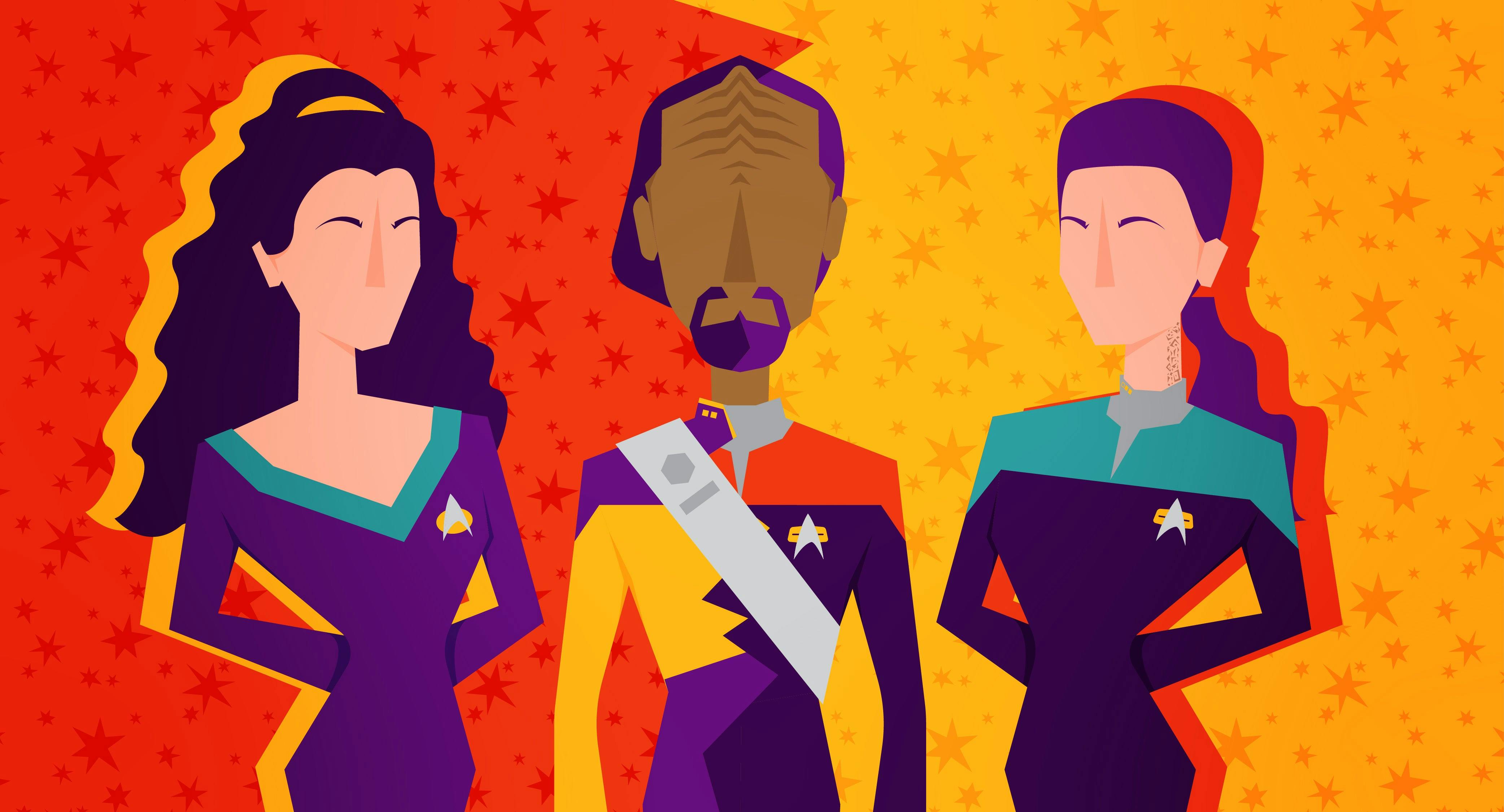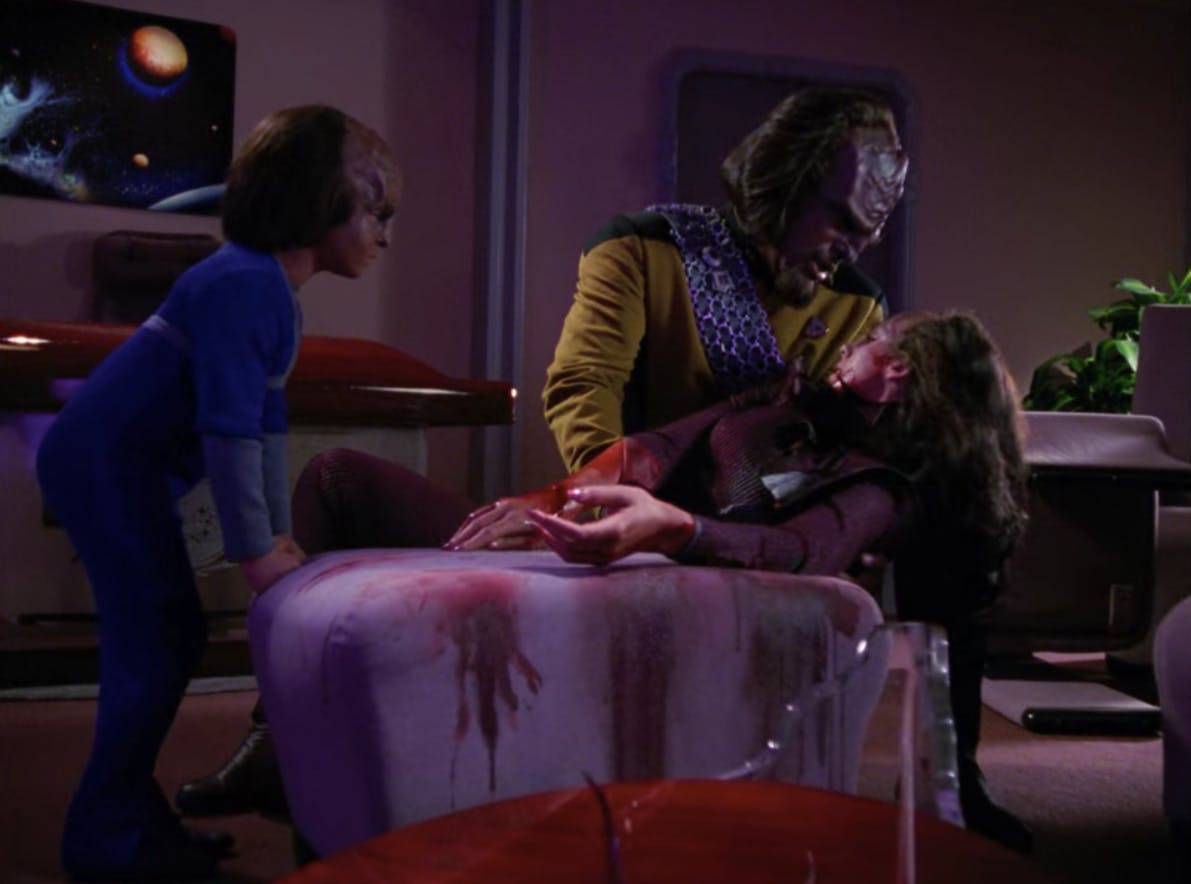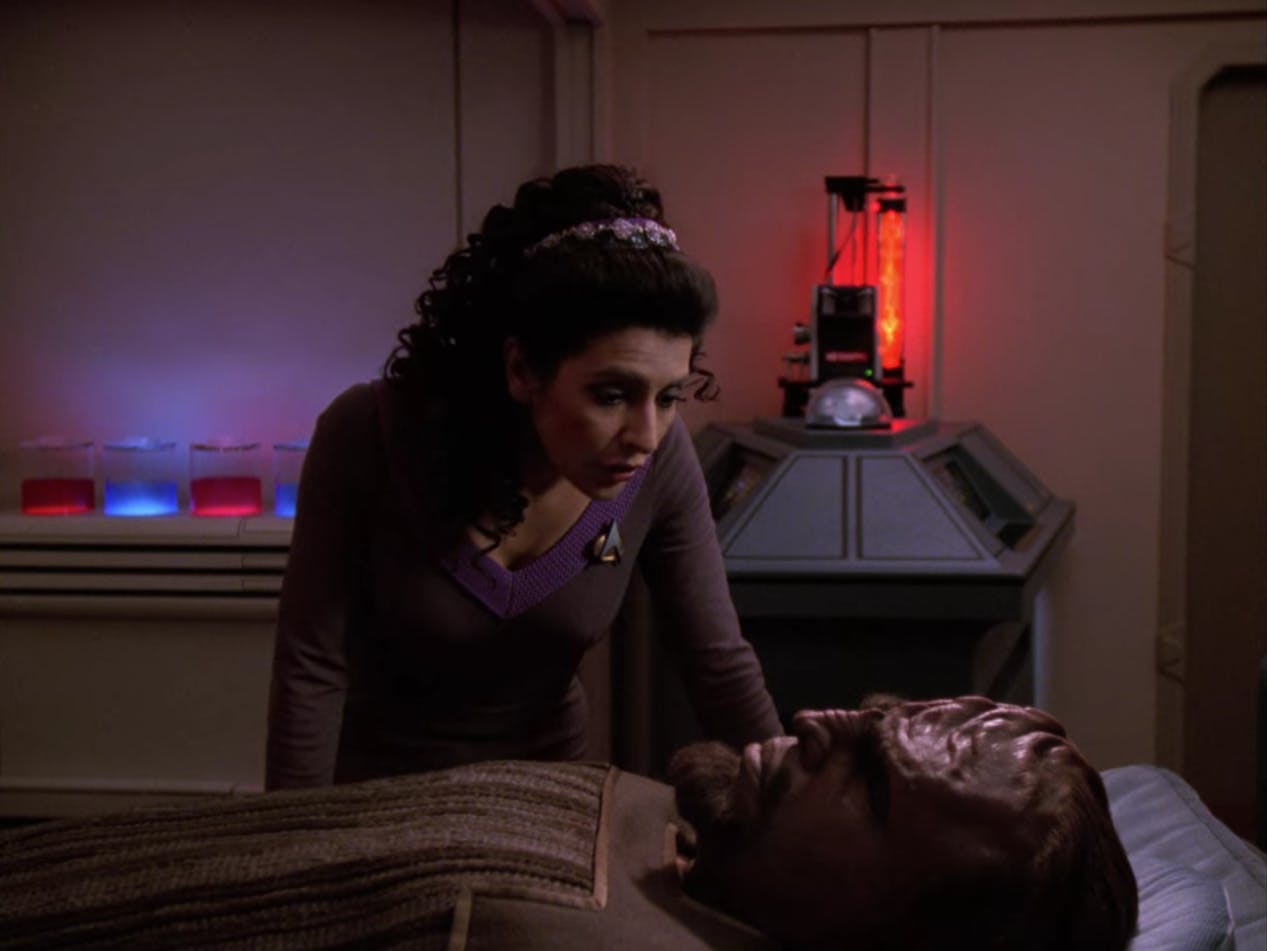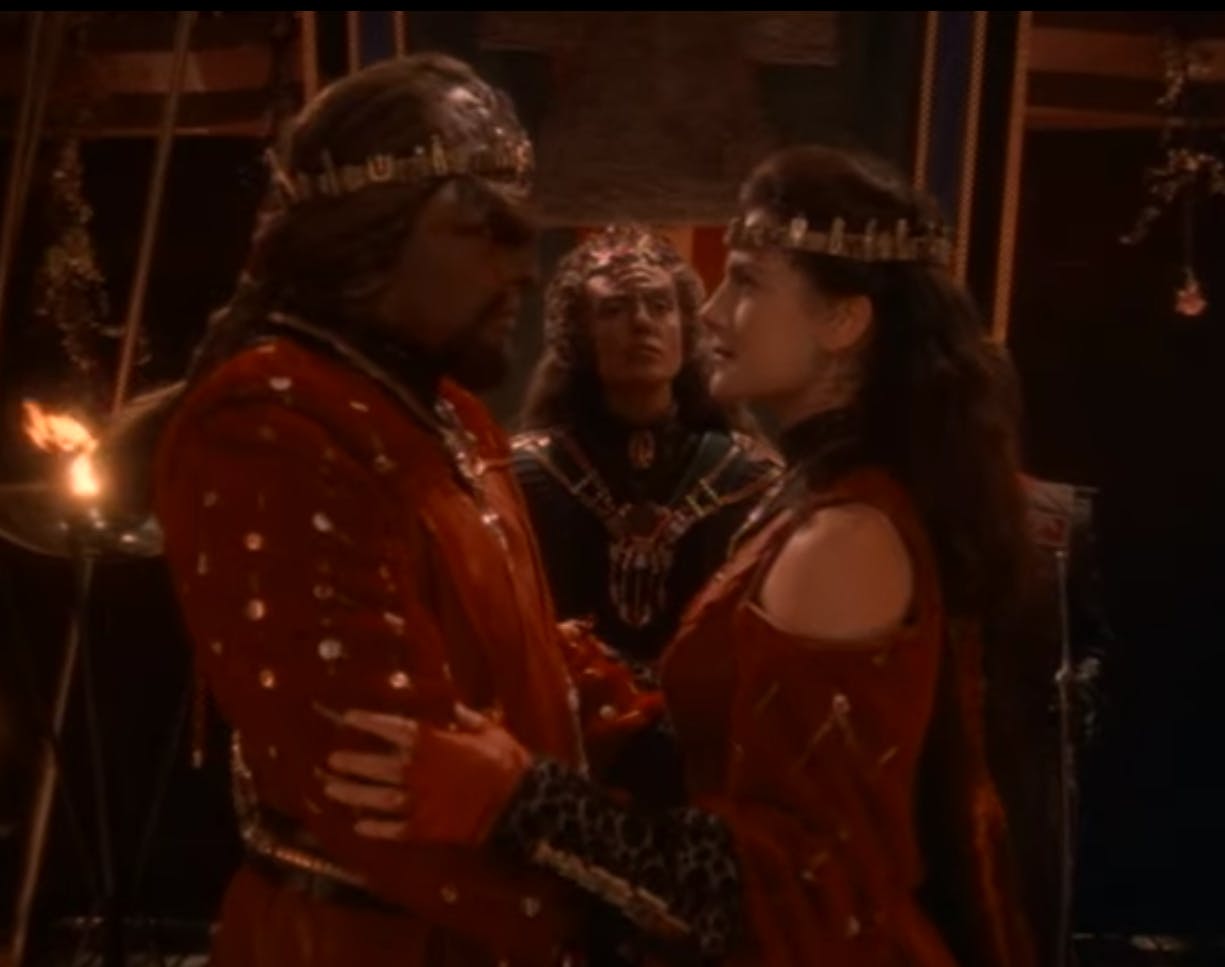Published Sep 23, 2022
How Love Changed Our Favorite Klingon Worf
'Worf’s growth throughout the series explores questions of honor, pride and what it means to 'be a man.''

StarTrek.com
In the Star Trek Universe, Klingons are presented as being hyper-masculine, exemplifying all the unhealthy views of “traditional masculinity” in western society. They are highly patriarchal and prideful warriors singularly focused on maintaining a reputation of strength. Any signs of emotions that aren’t antagonistic or hostile are considered weak and unbecoming. This mentality permeates to every level of their culture from their dislike of bathing and doctors to the fact that there’s no Klingon word for “jolly.” Chances are that you’d never encounter a Klingon ship willing to ask for directions either.
When we first meet Worf he is the epitome of toxic masculinity. Born on the Klingon homeworld but raised by humans, he is insecure about his heritage and constantly feels the need to prove his “Klingon-ness.” This insecurity manifests as constant suggestions to Captain Picard to be more aggressive in his actions and an initially detached demeanor with his crewmates.
His first significant romance is with K'Ehleyr, a half-Klingon, half-human woman, who similarly feels trapped between two cultures. However, unlike Worf, she rebuffs Klingon values and embraces her human side. She even refuses multiple proposals from him that she believes are made to appease his arcane concepts of obligation. Although she is eventually killed by Duras — a political figure in the Klingon empire — she secretly gives birth to their son Alexander.

StarTrek.com
Her devastating demise shows Worf the consequences of holding on too rigidly to concepts of “honor.” The reason they had ultimately not wed was because Worf was disgraced in the Klingon culture, and he did not want to bring shame to his son. Now, suddenly a single parent, he is forced to question his views on manhood while raising a young boy.
It is his son's presence on the ship that becomes the catalyst for his relationship with Counselor Deanna Troi. Since Alexander wasn’t brought up with Klingon values, she acts as a mediator and surrogate mother for the two. Worf eventually asks her to formalize this arrangement and become Alexander’s “Sol-Chim,” or godmother. While helping raise his son, she encourages him to be more vulnerable and consider the effects of his egocentric actions on others.
Her influence is best exemplified in the Season 5 episode “Ethics'' where Worf is thought to be permanently paralyzed after an accident. He decides it would be preferential to be put to death than continue to live in this new reality. Deanna is the one who pushes him to reevaluate his priorities and consider his son’s well-being above his own selfish pride.

StarTrek.com
At the end of the episode, after a miracle treatment of course, we see Worf acquiesce to letting Alexander assist him when he struggles with his physical therapy. It’s through Deanna's guidance that he comes to realize there's more strength in dealing with your emotions than in suppressing them and lashing out. Although their connection is further explored in “Parallels,” where the two are married in an alternate timeline, they pursue a short-lived relationship which ends off-screen.
Finally, we come to Jadzia Dax, who can arguably be called the love of his life. Unlike his previous romantic partners, Jadzia did something that no one from his past truly did. Instead of pushing him to accept the morality of human culture, she embraced Klingon heritage. Although, during much of the show, most Klingons are focused on maintaining their image instead of the ethical demands of honor; Jadzia saw the nobility in their traditions. Her previous host, Curzon Dax, was a top Ambassador during numerous negotiations with Kllingons and had earned the respect of their people. As a Trill, Jadzia inherited his memories and admiration for their heritage. We see her commitment to this in the episode “Blood Oath,” when she follows through with a promise Curzon made to a group of Klingons. She does this not out of obligation, but because she genuinely feels it is right and honorable. This way, much like Worf, although she is “othered” among the Klingons, she is still immersed in its culture.
When Worf arrives on DS9, Jadzia welcomes him with advice, companionship, and Klingon Opera. She also earns his respect by continuously challenging his more sexist beliefs. When he mistakenly assumes her Klingon training Holo-program belonged to her previous male host, she assures him it’s hers. When she challenges him to a bat’leth match in “The Way of the Warrior” and notices he’s holding back, she tells him not to. Even in their courtship, it’s Jadzia who makes the first move and is a constant source of support in Klingon matters. When Worf is temporarily given command of a Klingon bird-of-prey in “Soldiers of the Empire,” she joins him after noticing the tense dynamic of the crew and expertly handles those on board.Through their relationship, we see Worf evolve; and once they decide to get married, he is the one planning their dream wedding for months beforehand. This illustrates his sense of security both in their relationship and his masculinity to take on something usually considered to be the bride’s prerogative.

StarTrek.com
We also see a shift in his understanding of “honor” while with Jadzia. On a mission, where she is severely wounded, he has to make a choice between saving his wife or completing his duty. Instead of abandoning her and pursuing “victory in battle” — which is certainly the Klingon way — he decides to rescue her instead. This results in a blemish on his record, a blow to the war, and a loss at the chance of ever getting a command position. In that moment, he decided that sometimes the most honorable thing to do is perhaps not what a traditional Klingon might do. Unfortunately, as Jadzia and Worf were planning on starting a family, she was suddenly attacked and died just the same. But their relationship left him changed for the better.
Worf’s growth throughout the series explores questions of honor, pride and what it means to “be a man.” While initially conforming to the mandates of masculinity prescribed by Klingon culture, he slowly evolves his beliefs through the emotional connections he makes with others. Ultimately, these relationships allow him to reexamine his values and create his own understanding of honor. It is the love he receives, and in turn, gives to others that transforms his beliefs and we could all learn a lesson through his experiences.
This article was originally published on May 14, 2021.
Zoe Malik (she/her) is a lifelong Star Trek fan and writer based in New York. She is currently the News Producer at Full Frontal with Samantha Bee and occasional producer/writer for YouTube channels including TheTryGuys. Before pursuing her passion for writing she was the Science Researcher Coordinator at NYU Langone Medical Center.
Stay tuned to StarTrek.com for more details! And be sure to follow @StarTrek on Facebook, Twitter, and Instagram.

